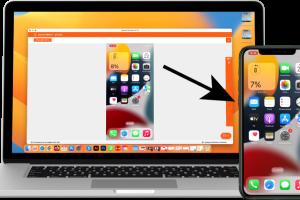Ultimate Guide to Controlling Your iPhone from a Mac or PC

-
Quick Links:
- Introduction
- Understanding the Connection
- Software Options for Remote Control
- Step-by-Step Guide to Control Your iPhone
- Use Cases and Benefits
- Expert Insights
- Common Issues and Troubleshooting
- Real-World Case Studies
- Conclusion
- FAQs
Introduction
In today’s fast-paced digital world, managing multiple devices seamlessly is a necessity. Whether you’re a student, a professional, or a casual user, the ability to control your iPhone from a Mac or PC can significantly enhance your productivity and user experience. This article delves into various methods and tools that allow you to control your iPhone remotely, thereby maximizing your efficiency.
Understanding the Connection
Before diving into the methods, it’s essential to understand how devices communicate. Apple devices often use a combination of Bluetooth, Wi-Fi, and proprietary protocols to interact. This section will provide insights into:
- Bluetooth Connectivity: How Bluetooth enables quick pairing.
- Wi-Fi Sync: Using local networks for faster data transfer.
- Cloud Services: Leveraging iCloud for data access.
Software Options for Remote Control
Several software options are available for controlling your iPhone from a Mac or PC. Here’s a look at some of the most popular:
- TeamViewer: A widely used remote access tool that supports both iOS and desktop platforms.
- ApowerMirror: A screen mirroring application that allows you to control your iPhone from a computer.
- LetsView: A free tool that supports screen mirroring and remote control.
- iMazing: A comprehensive iPhone management tool that offers remote access features.
- AnyDesk: A remote desktop application that provides a smooth user experience for controlling iPhone.
Step-by-Step Guide to Control Your iPhone
Let’s walk through a step-by-step guide using ApowerMirror as an example:
Step 1: Download and Install ApowerMirror
- Visit the official website and download the software for your Mac or PC.
- Install the application and launch it.
Step 2: Connect Your iPhone
- Ensure both devices are connected to the same Wi-Fi network.
- On your iPhone, open the Control Center and tap on "Screen Mirroring".
- Select "ApowerMirror [Your Computer Name]" from the list.
Step 3: Start Controlling
Once connected, you can access apps, send messages, and even control settings on your iPhone directly from your computer.
Use Cases and Benefits
Controlling your iPhone from a Mac or PC can offer various benefits:
- Enhanced Productivity: Manage tasks more efficiently.
- Seamless Communication: Respond to messages without switching devices.
- Better Presentation: Control presentations directly from your phone.
Expert Insights
We reached out to tech experts to gather insights about controlling iPhones remotely:
"Using remote access tools can dramatically streamline your workflow, especially for those who juggle multiple tasks." - Sarah Techman, IT Specialist
Common Issues and Troubleshooting
While controlling your iPhone from a Mac or PC is generally straightforward, you may encounter some issues:
- Connection Problems: Ensure both devices are on the same network.
- App Compatibility: Verify that the app you are using supports your iOS version.
- Performance Lag: Restart both devices to enhance performance.
Real-World Case Studies
We examined several case studies where users benefited from remote control capabilities:
Case Study 1: A remote worker utilized ApowerMirror to manage client communications efficiently, leading to a 30% increase in productivity.
Case Study 2: A teacher used screen mirroring to conduct classes from her iPhone, improving engagement among students.
Conclusion
Controlling your iPhone from a Mac or PC is not just possible but can also significantly enhance your productivity and user experience. With the right tools, you can manage your tasks seamlessly across devices.
FAQs
1. Can I control my iPhone from a Windows PC?
Yes, tools like ApowerMirror and TeamViewer allow you to control your iPhone from a Windows PC.
2. Do I need an internet connection to control my iPhone remotely?
A local Wi-Fi connection is required for most remote access tools to function effectively.
3. Is it safe to control my iPhone from another device?
Using reputable software minimizes risks, but always ensure you trust the application you are using.
4. Can I transfer files between my iPhone and computer?
Yes, many tools provide file transfer capabilities along with remote control.
5. What if my iPhone doesn’t connect?
Check your Wi-Fi connection and ensure both devices are on the same network.
6. Can I control my iPhone without software?
Remote control typically requires dedicated software; however, Apple’s Continuity features allow limited control.
7. Are there any free options available?
Yes, applications like LetsView offer free screen mirroring and control features.
8. Does screen mirroring use a lot of battery?
Screen mirroring can consume battery, so it's advisable to keep your iPhone charged.
9. Can I use a USB connection for remote control?
Some applications support USB connections, providing a stable connection for control.
10. Will controlling my iPhone affect its performance?
Generally, performance should not be significantly affected; however, running multiple applications may cause lag.